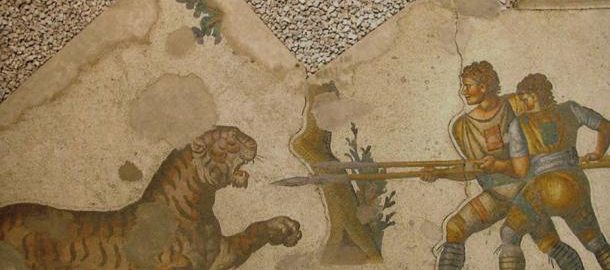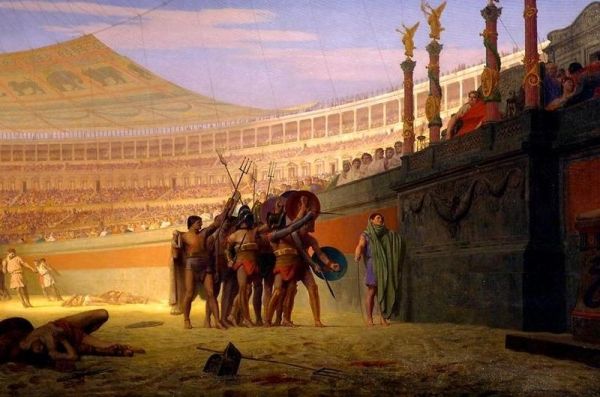Chapters
The Roman arena was full of extraordinary stories as well as frightening stories. I am going to introduce you to a few of them today.
Eppia’s passion
Eppia was the wife of a senator, and her childhood was spent in all luxuries; she slept in swan feathers, in a cradle decorated with gold. Nevertheless, she had a passion for Sergiolus, a gladiator not of his first youth, also famous for his hideous appearance. Juvenal rushes us with a portrait of this unfit bachelor husband:
And what were the youthful charms which captivated Eppia? What did she see in him to allow herself to be called “a she-Gladiator”? Her dear Sergius had already begun to shave; a wounded arm gave promise of a discharge, and there were sundry deformities in his face: a scar caused by the helmet, a huge wen upon his nose, a nasty humour always trickling from his eye. But then he was a gladiator! It is this that transforms these fellows into Hyacinths! it was this that she preferred to children and to country, to sister and to husband. What these women love is the sword: had this same Sergius received his discharge, he would have been no better than a Veiento.
– Juvenal, Satire VI
After all, for this man, Eppia was ready to endure all kinds of insults and condemnations from the Romans. With Familia Gladiatoria, to which Sergiolus belonged, she travelled through many provinces, even reaching Asia Minor and Egypt. This led to her nickname gladiatrix, a female gladiator. It was a great insult because gladiators were in a lower position than slaves. It seems incredible that Eppia sacrificed her privileged life among the upper strata of society, abandoning her husband and children forever for Sergiolus and his blood-soaked world. But she did just that because Sergiolus was a gladiator.
Androcles and Lion
The most famous legend of the arena is of course the one about Androcles and the lion. It tells how a Dacian slave came face to face with a dangerous lion, which, however, refused to attack him and started licking his feet. When the leopard was released into the arena, the lion lunged at him and tore him to shreds. The Editor of the Games, Druzus, had a slave brought in, wishing to find out why the lion refused to attack him. Androcles related how he escaped from his master, proconsul of Africa, and hid in a cave in the desert. Once a lion came to him with a thorn on its paw. Androcles took it out, and the grateful lion began to serve him, bringing fresh meat to the cave where the slave was hiding from the soldiers looking for him. Finally, he got bored with this rather monotonous diet and left his hiding place. After which he was captured. His master sentenced him to a punishment ad bestias. The legend ends with giving freedom to both Androcles and the lion, whose mane was woven with flowers.
Conception of Commodus
Sometimes the amorous elation that the sight of a gladiator evoked in women could have extremely unfavourable repercussions for himself, as evidenced by this fragment of Historia Augusta:
Faustina, daughter of Antoninus Pius and wife of Marcus Aurelius, having seen the gladiators pass one day, conceived the most violent love for one of them; and this passion having made her ill for a long time, she confessed it to her husband. Chaldeans whom Marcus Aurelius consulted, said that it was necessary that this gladiator should be killed and that Faustina should bathe in his blood and afterwards lie with her husband. When this advice had been followed, the empress’s passion was in fact spent, but she brought into the world Commodus, who was more of a gladiator than a prince.
– Historia Augusta
Poor gladiator. His successors already knew not to walk near the empresses. But no one told them that the emperors were even worse.
“Ave, emperor! Morituri te salutant!”
It is commonly believed that this was the starting signal for the show with gladiators, however, there is no clear evidence for it. Suetonius describes a certain situation that occurred during the reign of Claudius. Then gladiators, sentenced to death for crimes, were to shout “Hello, Emperor! Those who are to die, salute you!”. Claudius replied jokingly, “Or not.” Desperate criminals regarded the emperor’s ambiguous statement as a pardon and refused to fight.
Of course, there are many more stories like these, and you can find them almost everywhere. They were a variety of “ordinary” gladiator games, which, however, quickly began to get bored with people and there was a need for more and more variety. For example, Julius Caesar first brought a giraffe to Rome to show it in the arena, and later more than five hundred elephants with which regular infantry fought. Earlier, he ordered the fighters to wear silver, shiny armour, but after the idea was picked up by several other senators, the people, who were always thirsty for novelty, were very quickly eaten. Panem et circenses!









